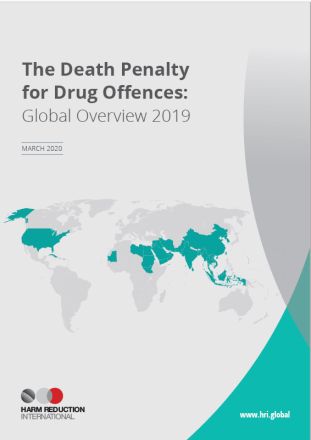
The Death Penalty for Drug Offences: Global Overview 2019
download full reportmain findings
35
countries retain the death penalty for drug offences
122
executions were confirmed in 2019
180+
death sentences given in 2019 in 13 countries
3000+
people are currently in death row for drug offences worldwide
Introduction
Harm Reduction International (HRI) has monitored the use of the death penalty for drug offences worldwide since our first ground-breaking publication on this issue in 2007. This report, our ninth on the subject, continues our work of providing regular updates on legislative, policy and practical developments related to the use of capital punishment for drug offences, a practice which is a clear violation of international law.
Executive Summary
Thirty-five countries retain the death penalty for drug offences, and both the handing down of death sentences and executions for drug offences – often following unfair trials – continued in 2019. Laws which permit or mandate the imposition of the death penalty for a drug-related offence are inconsistent with the right to life. Furthermore, the sentencing of a person to death or their execution for a drug offence following a trial that fails to meet international standards of fairness is an arbitrary deprivation of life – violating the right to life, the right to a fair trial, and the prohibition of inhuman or degrading treatment or punishment guaranteed by international human rights law and standards.
In the last decade, the application of the death penalty for drug offences has fluctuated, with known executions peaking at 755 in 2015. Since then, Harm Reduction International (HRI) has documented a predominant downward trend. Following important reforms, particularly in Iran, known executions for drug offences dropped to 93 in 2018, the lowest figure HRI has recorded since it began working on this issue in 2007.4 122 drug-related executions were confirmed for 2019, accounting for 18% of total known executions carried out around the world. While still lower than figures recorded between 2008 and 2017, these numbers represent a 31% increase from 2018, and may signal a reversal in the encouraging trend reported in recent years.
Historically, international attention has been focused on the carrying out of executions more than pronouncing of sentences, and it is possible that states have become more reluctant to actually carry out the punishment as a result. The data on sentencing, however, suggests that support for capital punishment is still very strong.
Currently, at least 3,000 people convicted of drug offences languish on death row (with the actual figure likely to be much higher), many of whom have been there for a decade or more, and hundreds more continue to be sentenced to death every year. Recently, the number of known death sentences for drug offences has been fluctuating, rising between 2016 and 2018 and decreasing slightly in 2019, despite an overall global decline in the sentencing of people to death for all crimes during the same period.
This report demonstrates the need to monitor much more closely the entire criminal justice process in capital cases, and capital drug cases in particular. Indeed, violations of the right to a fair trial occur, often on a systemic level, in states that hand down sentences for drug offences. The correlation between the two is not a coincidence. The cases reviewed in the following pages reveal that violations of fair trial rights play a central role in the imposition of death sentences for drug offences.
Fair trial concerns recurring in capital drug cases are the focus of the present report. As respect for fair trial guarantees in all capital cases is of paramount importance, this report looks at the various ways in which established international human rights standards and safeguards are systemically flouted in six states that retain the death penalty for drug offences. Particular attention is given to legal mechanisms or sentencing practices that disproportionately impact capital drug defendants as a manifestation of the exceptionalism of drug control. What emerges is a clearer picture of the criminal justice systems of retentionist countries, which gravely impede the chances of individuals charged with capital drug offences of receiving a fair trial. The result is that capital drug defendants, often already some of the most vulnerable individuals in both society and the drug trade, are placed at greater risk of receiving a death sentence and of being executed.
With death sentences for drug offences continuing to be meted out and hundreds of people awaiting execution following unfair judicial procedures, there is an urgent need to draw more attention to this issue, and to work with retentionist states to reform their criminal justice systems, all while taking steps to ultimately abolish the death penalty altogether.
Related resources
Don't miss our events and publications
Subscribe to our newsletter